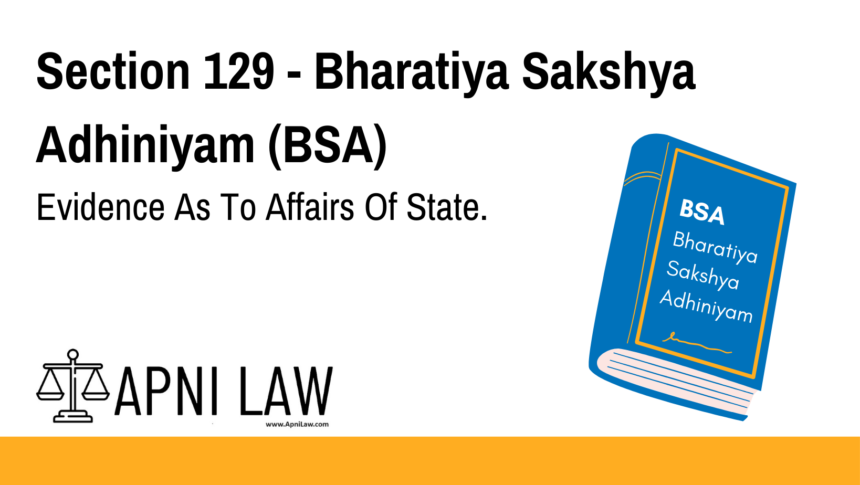Code: Section 129 BSA
No one shall be permitted to give any evidence derived from unpublished official
records relating to any affairs of State, except with the permission of the officer at the head
of the department concerned, who shall give or withhold such permission as he thinks fit.
Explanation of Section 129 BSA
Section 129 of the Bharatiya Sakshya Adhiniyam, 2023, protects the confidentiality of sensitive government records relating to the affairs of the State. It bars any person from giving evidence based on unpublished official records unless specifically authorized by the head of the concerned government department.
This section is rooted in the principle of public interest and national security. It ensures that sensitive information — especially those related to defense, diplomacy, or internal security — is not disclosed in legal proceedings unless approved by the appropriate authority.
Key Provisions:
- Evidence from unpublished official records relating to State affairs is restricted.
- Permission is required from the head of the concerned department.
- The department head has complete discretion to grant or withhold permission.
- The intent is to safeguard the interests of the State, particularly in matters involving sensitive or classified information.
Illustration
Example 1: Defense Documents in a Criminal Trial
During a trial, a party attempts to introduce a classified internal communication from the Ministry of Defence. Since the record is unpublished and relates to State affairs, it cannot be admitted as evidence without permission from the Secretary of the Defence Department.
Example 2: Internal Government Memos on Policy Decisions
An internal memo about upcoming government policy is sought to be introduced as evidence in a civil dispute. As the memo is an unpublished official record concerning State affairs, it can only be used if the department head (e.g., a senior bureaucrat in the concerned ministry) approves.
Common Questions & Answers on Section 129 BSA
1. What is meant by “affairs of State”?
It refers to matters involving governance, national security, foreign relations, internal law enforcement, and other sensitive governmental functions.
2. Who has the authority to allow the use of such evidence?
Only the officer at the head of the relevant government department can grant or deny permission.
3. Can the court compel the department to disclose the records?
No. The department head has full discretion under Section 129. The court cannot force disclosure.
4. What if the evidence is crucial to the case?
Even if the evidence is crucial, it cannot be introduced without proper permission. The law prioritizes national interest over individual cases in such scenarios.
5. Does this apply only to criminal cases?
No. Section 129 applies to all proceedings — civil, criminal, or administrative — where unpublished official records related to State affairs are sought to be used.
Conclusion
Section 129 of the Bharatiya Sakshya Adhiniyam serves as a safeguard for protecting sensitive State information from unauthorized disclosure in judicial proceedings. While it may limit access to certain types of evidence, it reinforces the principle that national security and public interest take precedence over individual disclosure in court. It gives decision-making power solely to the administrative head of the concerned department.
For more detailed legal insights and updates on evidence law in India, visit ApniLaw.








